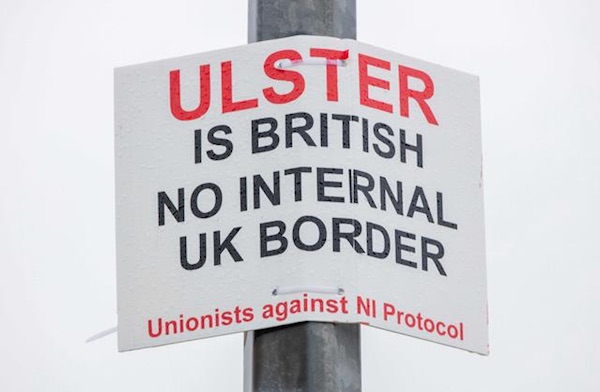
A weak response to the controversial inclusion of a reference to Brexit’s Irish Protocol in preliminary EU legislation for vaccine exports has encouraged unionist extremists to believe they can force a renegotiation of Brexit’s protocol on Ireland.
The Irish protocol of the Brexit Withdrawal Agreement, finally agreed in December, averted a possible remilitarisation of the border through the island although it created increased bureaucracy at ports on the Irish Sea.
Last weekend, the underhand inclusion in draft EU regulations of a section on Article 16, which allows for breaches of the protocol in the event of an unforeseen emergency, was inflamed into a far larger crisis over claims that a calamitous change to the agreement had been “triggered” or “activated”.
Accepting the reports at face value, Irish politicians responded angrily, condemning the European Commission for the crisis. But with little more than hand-wringing coming from Brussels in response, unionists, loyalists and Tories have been encouraged to renew their demands for a complete end to the protocol.
The more jingoistic elements of the British political establishment now believe they can drive home a Brexit advantage and damage the EU vaccine purchase programme at the same time, in a ‘double victory’, as the Daily Mail put it.
Meanwhile, the BBC has taken to broadcasting threats of a new campaign of violence by loyalism. Expanding on existing threats against port staff in Larne and Belfast, David Campbell of the Loyalist Communities Council said: “If it comes to the bit where we have to fight physically to maintain our freedoms within the UK, so be it.”
For its part, the DUP has launched a campaign to “unite unionism” against the Protocol with a petition of 100,000 signatures, in order to force a Westminster debate.
In the Commons at prime minister’s questions, DUP MP Ian Paisley urged Boris Johnson to “be the unionist we need you to be” by simply reneging on the protocol. He said it had “betrayed us, and has made us feel like foreigners in our own country”.
With deep hypocrisy, Johnson cast himself firmly on the moral high ground
“It was most regrettable that the EU should seem to cast doubt on the Good Friday agreement, the principles of the peace process, by seeming to call for a border across the island of Ireland,” he proclaimed.
“We will work to ensure that there are no such borders, we will respect the peace process and, indeed, no barriers down the Irish Sea and the principle of unfettered access across all parts of our United Kingdom is upheld.”
Johnson threatened to use article 16 of the protocol “to ensure trade flows freely”.
Despite repeated clarifications and the publication of the corrected legislation, the Dublin government offered no resistance to British pressure and by Wednesday afternoon Taoiseach Micheal Martin had quietly accepted demands to reopen the Brexit talks.
British cabinet office minister Michael Gove has now laid out a list of demands — six major concessions, including extensions on grace periods and a “permanent solution” on a range of goods traded, all without offering any concessions on all-Ireland issues.
And he repeated the warning that London could simply do what it wants unless its demands are met. “If it is not possible to agree a way forward in the way we propose, then the UK will consider using all instruments at its disposal,” he said.
The sense of confusion in Ireland has been deepened by the mistaken belief that the EU has somehow caused a unilateral change to the Brexit deal. Accepting the DUP’s demand for change, the 26 County foreign affairs minister Simon Coveney said their goal of doing away with the protocol entirely was “completely unrealistic”.
“There are some people who are trying to re-write history,” he said.
The European Commission’s President Ursula von der Leyen said it is exploring all “flexibilities” available within the existing agreement. Sinn Féin’s Caoimhe Archibald welcomed the Commission President’s commitment.
She said: “While we condemn the events of last week relating to Article 16, we are assured that the EU have learned lessons and are committed to making the protocol work. We call on the British government to show the same resolve by committing to proper solutions to the practical issues.”
![[Irish Republican News]](https://republican-news.org/graphics/title_gifs/rn.gif)
![[Irish Republican News]](https://republican-news.org/graphics/title_gifs/harp.gif)

